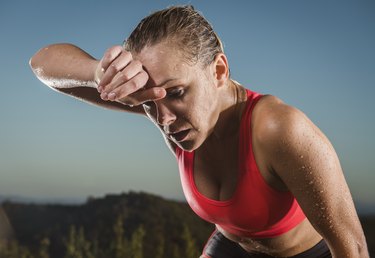
If you're running hot after a vigorous workout, you're not alone. The effect of exercise on body temperature is evident when you step off the treadmill or head to the showers after a group workout class. And while an increase in temperature might seem like a given, it's important to know why it happens.
Read more: Do You Burn More Calories Running in the Heat?
Video of the Day
Video of the Day
Does Exercise Increase Body Temperature?
Yes, exercise does increase body temperature. All it takes is a few minutes of cardio to feel the effect of exercise on body temperature. But why this happens and how long you expect it to stay elevated are the burning questions.
Body temperature increases during exercise because heat is created as your muscles create energy, says Brian Schulz, MD, sports medicine specialist and orthopedic surgeon at Cedars-Sinai Kerlan-Jobe Institute in Los Angeles, California. "Typically, the muscle stores a small amount of energy within, and once this has been used, it must create additional energy to continue the activity," he says.
This phenomenon is evident in an August 2017 study in the Journal of Thermal Analysis and Calorimetry, which found that during exercise, runners had more heat around their legs than their arms. Because runners use their legs more than their arms, the additional energy needed to continue running was evident in an increase in total body skin temperature over the calves and thighs.
When you use your muscles during exercise, 80 percent of the total energy is converted to heat, while only 20 percent is used for muscle contraction, says board-certified Philadelphia-based primary care doctor Ava Williams, MD. "This heat energy is distributed throughout your body and can cause your body temperature to increase," she says.
Average Body Temperature During Exercise
How high your body temperature rises during exercise depends on a variety of factors, including:
- Type of activity
- Climate
- Room temperature
As body temperature rises, your body has mechanisms to keep the core temperature at a safe level. "These mechanisms include shifting blood flow closer to the skin, breathing heavier and sweating," Dr. Schulz says.
Your ability to regulate temperature during exercise depends on myriad factors as well, he adds, including:
- Aerobic fitness
- Individual acclimatization
- Hydration status
- Genetics
How Long Body Temperature Stays Elevated
In general, your body temperature will return to normal shortly after exercise. However, Dr. Williams says, the increase in body temperature can persist for the next 15 to 20 minutes because your body is still working on its thermoregulatory function. "It takes time to cool your body back to a lower temperature," she says.
Even after exercise, Dr. Williams says, your body will continue to pump more blood and you will still sweat as a result of the heat energy coming from your muscles.
High Body Temperature During Exercise
To understand how high is too high, you need to take into account a normal body temperature. The average body temperature generally falls between a range of 97.5 to 97.9 degrees Fahrenheit, according to the Cleveland Clinic. A low body temperature, below 97.5 degrees, can be a sign of hypothermia or underlying health conditions.
Although it's normal to have a slight increase in body temperature during exercise, too much of an increase can be a red flag for a serious problem. If your core temperature rises above 104 degrees Fahrenheit, you may be experiencing heatstroke, according to the U.S. National Library of Medicine (NLM).
Heatstroke can happen when you exercise in hot weather and your cooling system has to work on overdrive. Per the NLM, some common signs of heatstroke — which require immediate medical attention — include:
- Fever
- Shallow or rapid breathing
- Rapid or weak pulse
- Confusion
To help you stay cool and avoid an unsafe rise in temperature during exercise, drink plenty of fluids throughout the day, including during physical activity, according to the NLM. It's also a good idea to avoid the warmest times of the day and shift your activity to the morning or evening.
Is this an emergency? If you are experiencing serious medical symptoms, please see the National Library of Medicine’s list of signs you need emergency medical attention or call 911.